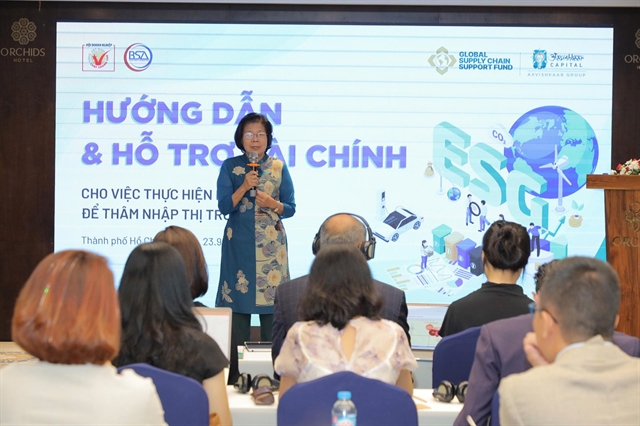All major export markets are putting up increasingly higher green barriers, especially related to ESG (environmental – social – governance) criteria, and Vietnamese businesses must prepare now to avoid being excluded from global supply chains, a seminar heard in HCM City on September 23.

HCM CITY — All major export markets are putting up increasingly stringent green barriers, especially related to environmental, social, and governance (ESG) standards, and Vietnamese businesses must act now to avoid being excluded from global supply chains, a seminar heard in HCM City on September 23.
Experts at the seminar “Guidance and Financial Support for ESG Implementation to Access the EU Market” organised by the High-Quality Vietnamese Goods Business Association and various professional organisations also outlined new policy trends, emerging green barriers and opportunities for businesses to tap into sustainable investments.
In her opening remarks, Vũ Kim Hạnh, chairwoman of the association, said: “We want to help businesses prepare ESG reports that meet requirements, but, more importantly, we want them to build meaningful, practical activities.
“ESG is no longer just for large corporations; it is equally essential for small- and medium-sized enterprises and agricultural startups.”
Nguyễn Cẩm Chi, director of sustainability consulting at MCG Management Consulting, pointed out that major green barriers facing Vietnamese exports to the EU include the Carbon Border Adjustment Mechanism, which requires businesses in certain sectors to measure and transparently report supply chain emissions, and the EU Deforestation Regulation, which bans imports of agricultural and forestry products linked to deforestation.
She added that under the EU Corporate Sustainability Reporting Directive and the European Sustainability Reporting Standards, effective from 2024, tens of thousands of large European companies must publish detailed ESG reports, creating downstream pressure on Vietnamese suppliers.
Other markets are also tightening requirements: the US enforces restrictions such as the Uyghur Forced Labour Prevention Act (UFLPA), while Japan, South Korea and Singapore require stringent green certifications for most imports.
Chi highlighted three key challenges for Vietnamese firms in implementing ESG: limited knowledge, financial constraints and high initial costs, and a lack of transparent data and management systems. But she stressed that these challenges also open opportunities: “When many say something is too difficult, if you can do it, you will gain a competitive advantage.”
With the new legal framework recently issued, businesses now have more favourable conditions for adopting ESG practices, particularly in accessing financial support, she said.

One important component of ESG is Extended Producer Responsibility (EPR).
According to Chu Thị Kim Thanh, deputy CEO of PRO Vietnam Packaging Recycling JSC, EPR requires producers to take responsibility for the full lifecycle of their products, including when products and packaging become waste.
In Việt Nam, EPR has been mandatory under the 2020 Environmental Protection Law, which obliges producers and importers to recycle recyclable products and packaging, and to treat waste from those that are difficult or impossible to recycle.
Enterprises can comply either by organising recycling themselves (directly, through contracted providers, or via authorised intermediaries) or by making financial contributions to the Environmental Protection Fund.
Alongside compliance challenges, ESG also opens the door to impact investment capital.
Abhishek Mittal, partner at Aavishkaar Capital, the impact investing arm of India-based Aavishkaar Group, said the fund has invested in early growth-stage enterprises since 2001 and now has more than US$500 million in assets under management.
Aavishkaar Capital will allocate $50–60 million through its Global Supply Chain Support Fund to Southeast Asia, with Việt Nam and Indonesia identified as the two key markets. The fund aims to make at least one investment in each country in 2025, he said.
Its three priority sectors are agriculture and food, supply chain solutions, and manufacturing and export. Investment targets include enterprises adopting sustainable farming and traceability technologies; providers of eco-friendly packaging, logistics services, green warehouses, cold-chain solutions, and climate-adaptive systems; and manufacturers of environmentally friendly products that reduce energy use, optimise raw materials, and follow ethical practices.
Nguyễn Duy Tâm, ESG director of Phúc Sinh Group, which has secured significant ESG-related funding, including a 575,000 euro ($634,363) non-refundable grant from the Dutch Fund for Climate and Development, said such investment should not be seen as a burden but as a commitment.
What investors and funds value most is whether a company’s roadmap is both feasible and transparent, he said.
He stressed that the success of ESG initiatives depends primarily on leadership, particularly in setting a clear vision and development roadmap. "To attract investment, companies must demonstrate their past achievements and be ready to present them transparently to investors." — VNS





